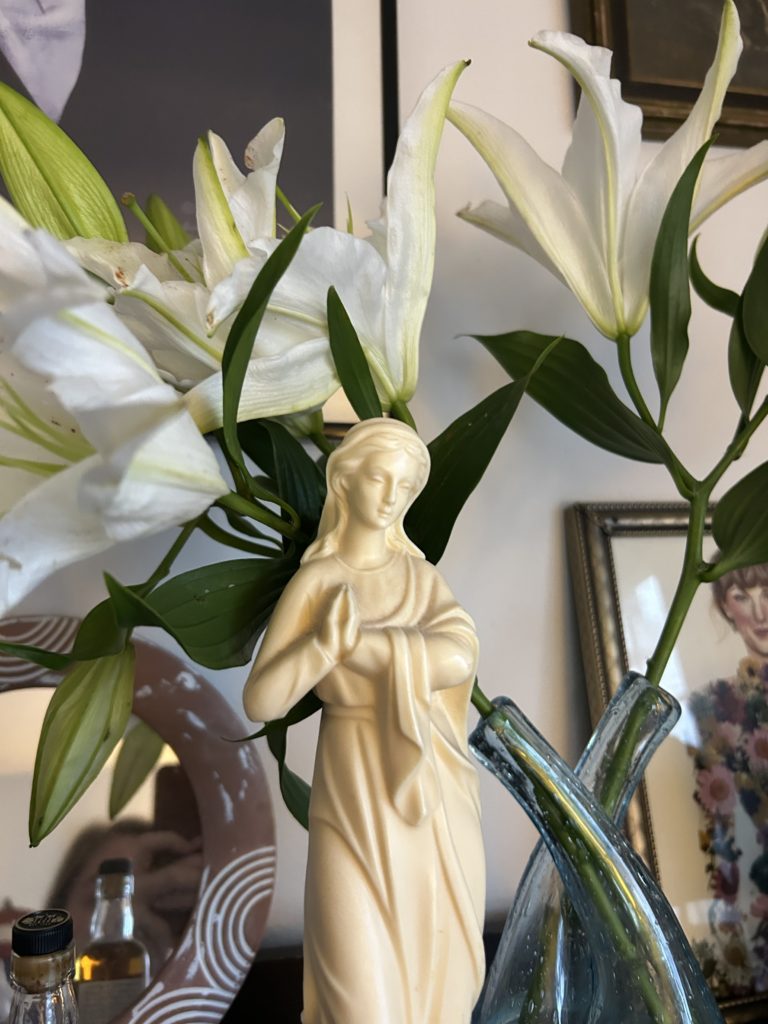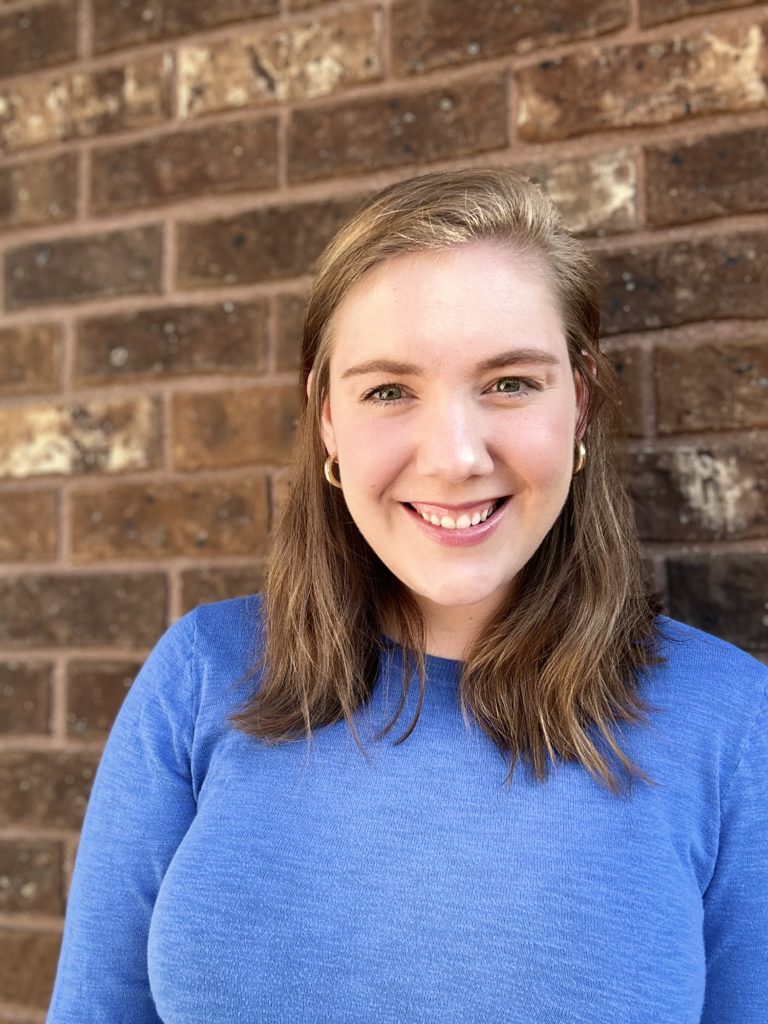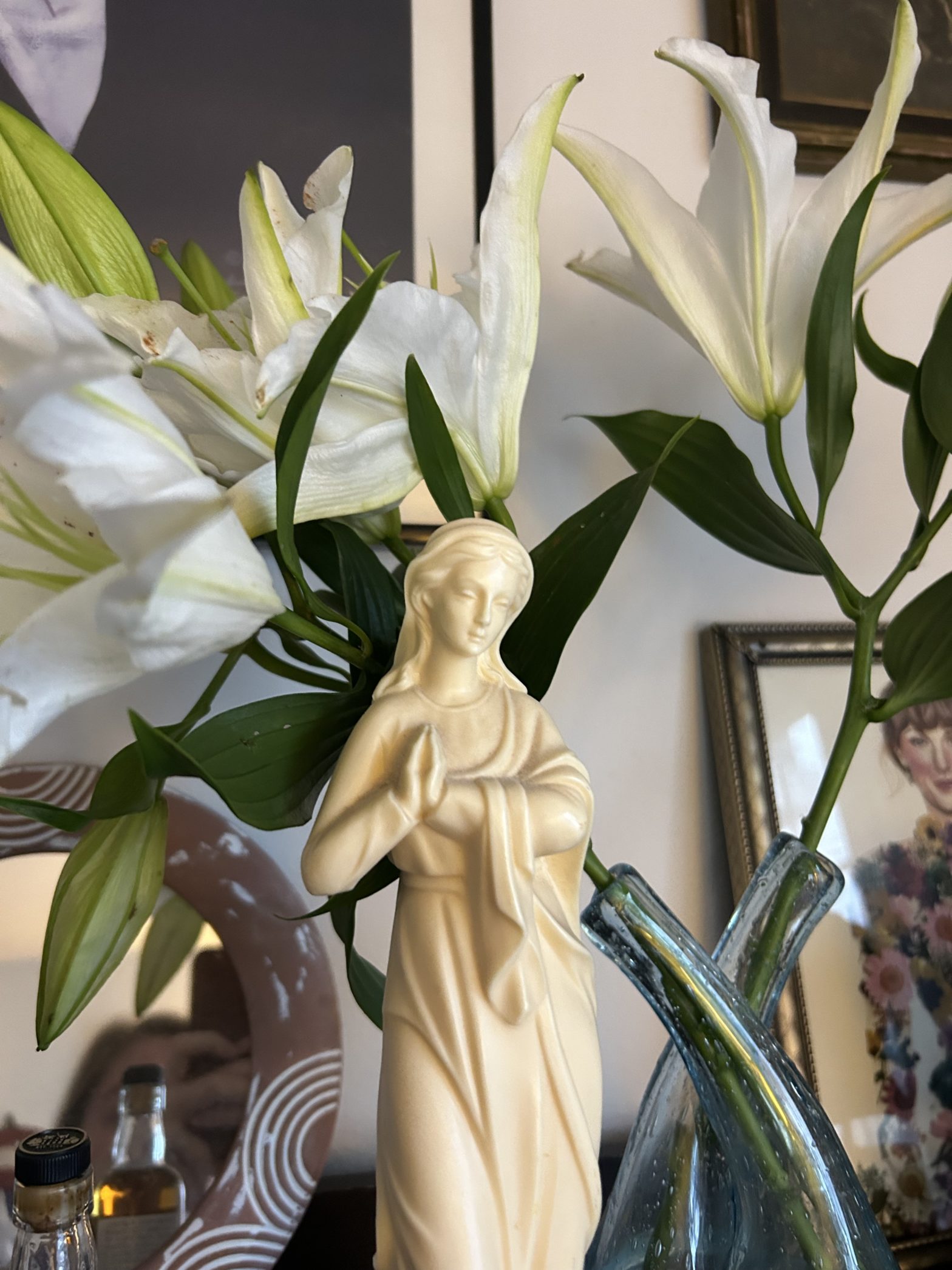
I.
In April of 2023, my husband, Jake, and I pulled up to a squatty, brick ranch on the south side of Holland, Michigan. It was newly ours—the most expensive thing we’d ever bought—and the fundamental symbol of the life we were both starting and returning to. We met in Holland, six years earlier, as students at Hope College. Before we pulled the Buick into the driveway of our house, we retraced the familiar sights and sounds of our college years, remembering afresh where we met for the first time (the sidewalk outside Big E’s sports bar), where we’d had our first real conversation (the second-floor common room of Kollen Hall), and where we’d shared our first kiss (the lawn of Klaasen Apartments). We’d left Holland four years before, in the summer of 2019, to move to Wisconsin, where I had been accepted into graduate school. Jake had followed, not yet sure what the future held for him besides, in the style of a late-1990s Matt Damon, the sense that he had to see about a girl.
In the intervening years, we got married and survived a global pandemic. I started and (nearly) finished grad school and had gotten a job as a professor. Jake, after moving to Madison with no connections or immediate prospects, single-handedly built an impressive career in health technology. Friends and family had married, moved, and passed away. Life had gone on, as life does. But something about our time in Madison had felt like a pause—like a gap. Madison was the in-between, the held breath in anticipation of what was to come. We often talked about it, and we imagined what might be waiting on the other side of our time there. Even though we knew it was unlikely, we talked about one day returning to West Michigan and to the place we met.
Pulling up to the little brick ranch in April of 2023 felt like the least likely of scenarios playing out before our eyes—like a thread through the eye of the world’s smallest needle. We had come home.
We had little time to revel in our good fortune, however, before the realities of home ownership struck. The remaining spring snow melted away, sending our two sump pumps into overdrive and leaving behind the barren landscaping of a home previously owned by a long line of single men. Our family flocked to us with housewarming and painting parties. My mother and I whiled away a few hot days digging in the dirt, planting lavender and carnations and peonies. We did find one unidentified plant—large and unwieldy and flowerless—that the previous owner had left behind and that had since sent up deep-rooted babies all over our front and back yards. We toiled against the plant and its satellites for hours; it was a sturdy and stubborn one—hard to kill. We emerged victorious, leaving behind only one small part of it—the tallest part—by the front door.
“You never know,” my mom said to me. “Maybe this summer, it will bloom.”
II.
Earlier, in the fall of 2022, home was not a brick ranch but a shabby apartment under an overpass in Madison, Wisconsin. In the second bedroom office, I crouched over my computer, lamenting the cruel and unjust timing that had necessitated my applying to my dream job before I had expected and before I felt ready. Jake and I had talked, so many times, about this job, the job I’d surely apply for in a long-off “someday,” the one we’d hoped would eventually bring us home. “Someday” took us by surprise, arriving early. Two roads stretched out before Jake and me: one, a straight road, guarded by a tall gate, at the end of which I could just make out the familiar landmarks of home; and the other, a long and winding path leading into mist and uncertainty. I stepped to the gate guarding the first path; I knocked.
Hope College, in my years as an undergraduate, had been a place of answered prayers. Many of them, I’d seen answered in the affirmative. I received abundantly: my forever best friends, my husband, my love for political theory. I had also seen prayers answered in the negative. During my time at Hope, I lost as many people as I gained, and I was given the great grace of sight with respect to my own iniquities. My dreams died at Hope as often as they came true. I stood now at the gate, hoping it would swing wide, but knowing that if it remained shut, that too would constitute an answer to a prayer.
It was a time of roiling anxiety—of hope and fear—but I was not alone. If this moment cast me as an academic Dante, spelunking the circles of interview process hell, I was not without a Virgil. My guide, both then and now, speaks the wisdom of the ages in a dialect I recognize. Seeing his pilgrim wracked with anxiety, with doubt, with fear, he repeated to me three words. He said them on the phone, sent them over text, and scribbled them onto postcards. Again and again, he entreated me: “Consider the lilies.”
Just before Thanksgiving of 2022, while awaiting a final phone call from Hope, with nothing left undone, I bought a lily from the grocery store. I placed it in a vase beside my statue of Mary. I considered it.
III.
And why take ye thought for raiment? Consider the lilies of the field, how they grow; they toil not, neither do they spin: And yet I say unto you, That even Solomon in all his glory was not arrayed like one of these. Wherefore, if God so clothe the grass of the field, which today is, and tomorrow is cast into the oven, shall he not much more clothe you, O ye of little faith? Therefore take no thought, saying, What shall we eat? or, What shall we drink? or, Wherewithal shall we be clothed? (For after all these things do the Gentiles seek:) for your heavenly Father knoweth that ye have need of all these things. But seek ye first the kingdom of God, and his righteousness; and all these things shall be added unto you.
Matthew 6:28-33[1]
IV.
What do I consider when I consider the lilies? Once, I wrapped this passage around me like a shield against the anxieties of my human life. I have savored its assurances of God’s protection over me, even when things seemed difficult and uncertain. This passage promises answers to prayers, and good answers at that. While I still find solace and beauty in that reading of these words, I am convinced that Matthew 6 is getting at something more. Specifically, this verse has come to instruct me in the proper response to answered prayers, and it has protected me not only from my anxieties but from my own sins of pride and willfulness. When I consider the lilies, I consider more than my own provision: I consider the scope and magnitude of God’s divine will and my tiny role in the grand story over which He is Author.
Matthew 6 instructs us to consider the lilies, and this consideration yields within us an appreciation of at least three truths about God. First, to consider the lilies is to acknowledge God as artist and architect. In considering the beauty of His world, in realizing the glorious colors of a lily’s raiment, we remember God as a maker of things good and lovely. Second, to consider the lilies is to remember our value in juxtaposition to other good and lovely created things. God loves and values human beings above all else in creation. Marked with the Imago Dei, we are made for Him, designed with the purpose of worshipping Him in life and being happy with Him forever in the life to come. Third, to consider the lilies is to recall the divine provision offered to us by God. He promises to drape us in clothes even more glorious and beautiful than those of lilies. He promises peace, shelter, and security, an alternative to restlessness and uncertainty. He promises us each and every good thing. This third truth calls to mind the assurances of the subsequent chapter, Matthew 7: “Ask and it will be given to you; search, and you will find; knock, and the door will be opened for you.”
It is this final consideration that is perhaps most important for us to get right and the one we’re most prone to getting wrong. This consideration of lilies often prompts us to consider our own good fortune. Sometimes, our promised resplendent robes are resplendent in the ways we desire. Other times, God gives us, to our eyes, burlap sacks. It is harder to trust God when our prayers go unanswered or are answered in ways we do not want or understand. Of this, every Christian is surely aware. Loving God and acknowledging His provision for us is easier when we receive affirmative answers to the prayers of our hearts. When our prayers are answered favorably—and we do receive raiment that looks resplendent to our own eyes—we find ourselves in danger of an even worse form of faithlessness. False gospels and simple human pride may lead us to believe that our favorably answered prayers say something about us, rather than about God. God’s merciful provision for us becomes, in our estimation, the natural result of a meritocracy.
Matthew 6 and Psalm 103, its sister verse of sorts, provide the antidote to this spirit of pride and self-dependence. Psalm 103 reads:
As for mortals, their days are like grass;
they flourish like a flower of the field;
for the wind passes over it, and it is gone,
and its place knows it no more.
But the steadfast love of the Lord is from everlasting to everlasting
on those who fear him,
and his righteousness to children’s children,
to those who keep his covenant
and remember to do his commandments.
And so, we are unlike the flowers of the field, but we are like them too. God loves us more than the flowers, but we are just as mortal, just as temporal. Our part to play in the narrative of God’s created world is, ultimately, not much longer than the life of a blooming lily that awakens in August and withers by September. Consideration of lilies, then, is, in part, consideration of our own impermanence, fragility, and smallness. It is a reminder that when God answer our prayers, favorably or unfavorably, He does so both for our own sakes and for the sake of His eternal plan and will for all creation. God never decontextualizes one individual person from the whole of creation; what’s good for one in His eyes must also be good for all, and vice versa—even if we do not understand how or why.
This has come to be my favorite of the great paradoxes of God: that His focus is both infinite and microscopic. He cares, deeply, for the provision of each individual person’s needs. He cares for our journeys, offers balm for our anxieties. But also He situates us within the whole of created time and space and answers our prayers accordingly. There is as much God in a nanosecond as there is in all the time since time’s beginning. His love is not quantifiable or containable; He loves each person as He loves all of creation; He has no need of proportion. God’s answers to my prayers are more than a private dialogue between us; they are notes in a symphony I will never know or hear on this side of heaven.
Since arriving at Hope, I sometimes look up—at my name next to my Office door, at a classroom full of students, at a faculty meeting with my former professors who are now my colleagues—and wonder to myself, how did I get here? Do I deserve to be here? Why did this door open to me? Why were my prayers answered? I am tempted to answer, because I earned it. Of course, I deserve it. Because I am good. Because I am favored. Matthew 6 and Psalm 103 bring me back to the truth of God and His providence. In that truth, I answer instead: I am here because, today, God has willed it. My understanding of my desert is incomplete in comparison to God’s knowledge of me and of the world. This door has opened to me because God might use me past its threshold. The answer to my prayers has nothing to do with me and everything to do with God.
To interpolate the words of the great saint once again, what do I consider when I consider the lilies? I consider their beauty, which hearkens to the greatness and glory of God. I consider my similarity to them—my impermanence and temporality. I consider my distinctiveness from them—my making in the Imago Dei. I consider God’s provisions for me, and my utter ignorance of His plan for His world and the significance of my life within it. When I consider the lilies now, it is difficult for me not to think of these words by the same great saint, who wrote:
Late have I loved You, beauty so old and so new: late have I loved You. And see, you were within and I was in the external world and sought you there, and in my unlovely state I plunged into those lovely created things which you made. You were with me, and I was not with You. The lovely things kept me far from You, though if they did not have their existence in You, they had no existence at all. You called and cried out loud and shattered my deafness. You were radiant and resplendent, You put to flight my blindness. You were fragrant, and I drew in my breath and now pant after You. I tasted You, and I feel but hunger and thirst for You. You touched me, and I am set on fire to attain the peace which is Yours.
My consideration of lilies is not for the sake of the lilies. My consideration of the lilies is not for my own sake. My consideration of the lilies lifts my eyes to God. The things of this earth that reveal His glory, that bear His handiwork, they only whisper of the great glory of heaven. The comparisons we draw between the flowers and ourselves only stand to illuminate the great sovereignty of God over all His creation. And late have I loved Him! Beauty so old and so new, late have I loved Him. Late have I been to realize that all searching, all pining, all desire is for Him. Late have I come to know His goodness and provision. Late have I been to accept the raiment He offers—whether it appear to me as resplendent robes or burlap sacks—as grace that covers my powerlessness and ignorance. Late have I considered the lilies and so considered Him.
V.
My grandparents own a dairy farm just outside of Big Rapids, Michigan. My father grew up there. When he met my mother in high school, she began spending much of her time there too, as dating a farm boy means dating the farm. My own childhood is littered with memories of the farm: the cold concrete milkhouse where I watched my grandfather perform his art, the calf barn alive with confused lowing and wet, hungry eyes, and the rolling, sloping walk between the old farmhand’s residence and my grandparents’ at the base of the hill. I remember the patch of tiger lilies that grew behind the farmhouse, on the edge of the woods. They towered, bright orange and a bit unruly, and in the summer, my grandmother would take me out to cut a few. She and I would sing together the familiar songs of the Psalter Hymnal as we felled the loveliest blooms to drop into her crystal vase. I remember my grandmother’s hands—small and tan and lined with years, and I remember that they were beautiful. I remember her voice, the words of the songs she would sing, and the peace that those words brought to me. And I remember the burning orange of the lilies, which were, to my young eyes, the most magnificent flowers I had ever seen.
VI.
As the summer of 2023 unfolded, the stubborn plant by the front door shot up a reedy, bendy stalk. One Thursday morning, as I left for a weekend conference, I noticed a bud on its end. “When I come home,” I thought to myself, “I’ll know for sure what kind of plant that is.”
When I returned, on a bright and cloudless Sunday afternoon, five orange petals, like the flexing fingers of a hand, spread out beneath the sunlight. I cupped the lily in my palm. I considered it.

Kirstin Anderson Birkhaug, Ph.D., is an assistant professor of political science. Her research is primarily on early American political thought, with an emphasis on the contributions of women.
Footnotes
[1] King James Version


